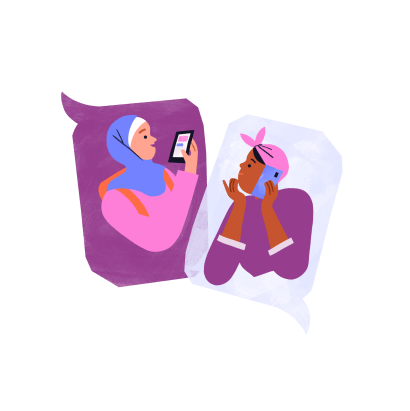Many people who have been raped, sexually abused or sexually assaulted feel confused or unsure about what has happened to them.
You might be wondering how to talk about what happened. Or, you might be wondering whether something ‘counts’ as rape, sexual assault, sexual abuse or something else.
The main thing to remember is that if something sexual has been done to you without your consent, that is sexual violence – and it is not your fault.

No matter what happened, we are here for you.
We will always listen to you, believe you and never judge you.
Was it rape, sexual assault or something else?
We often talk about different types of sexual violence, like ‘rape’ or ‘sexual assault’.
Sometimes these are are used as legal definitions. This means they are used by the police and criminal justice system to talk about what type of crime took place if someone reports something to the police.
You might find these definitions useful, or you might not – and that’s OK.
Remember – whatever the legal definition, if something sexual happened to you without your consent, that was sexual violence. At Rape Crisis, we think it’s important that you can talk about what happened in a way that feels comfortable for you.
We have more information about different types of sexual violence including rape, sexual assault, child sexual abuse, indecent exposure and sexual harassment.
What is consent?
Consent happens when all people involved in any kind of sexual activity agree to take part by choice. They also need to have the freedom and capacity to make that choice.
But, what does this mean?
Freedom means you agreed to take part without feeling any force, intimidation, pressure or manipulation.
Capacity means that you were able to make that decision. For example, you don’t have capacity if you were very drunk, drugged, asleep or unconscious – or if you were too young to consent to sex.
Consent doesn't happen when you are:
- Scared, threatened, bullied or forced.
- Manipulated, tricked or blackmailed.
- Asleep or unconscious.
- Drunk or ‘on’ drugs.
- Too young to consent to sex.
If you are wondering whether you consented or not, it might be helpful to think about what consent does look and feel like.
Sexual activity with consent might look like:
- Enthusiastically saying ‘yes!’.
- Talking to the other person about what you do and don't want, and listening to them in return.
- Checking in with the other person – for example, asking ‘is this okay?’, ‘do you want to slow down?’ or ‘do you want to stop?’.
- Respecting someone’s choice if they say ‘no’.
- Never trying to change someone's mind or put pressure on them.
Myths about rape and other types of sexual violence
There are a lot of myths about sexual violence that might make you feel like you are to blame for what happened.
Some of these myths might affect how you feel about what happened. They might make you feel like it was your fault, or it ‘wasn’t really’ rape, sexual assault or something else.
Unfortunately, these myths can also affect what your friends, family or others might say to you. Sometimes we call this ‘victim blaming’, and we know this can be very hard to deal with. If you’ve experienced this, you might want to talk to us.
These myths can also stop you from reaching out for support or telling other people. But, no matter what happened or what others say, we will always listen to you, believe you and support you.

Please try and remember, whatever happened, you are not to blame. Sexual violence is always the fault of the perpetrator, no matter who you are or what you did before, during or after.
You might be thinking...
You might have some of the thoughts below - but that doesn't mean it wasn't rape, sexual assault, sexual abuse or another form of sexual violence.
But I didn’t say no – I just froze?
It’s really common for people who experience rape, sexual assault or any other type of sexual violence to not be able to move or talk. This is an automatic response to danger. If you couldn't say "no" out loud, or if you didn't fight them off, this doesn't mean that you consented to any sexual activity.
But he is my husband/partner/ex?
It doesn’t matter who someone is, or how long you have been together – no-one has the right to do anything sexual with you without your consent.
But I shouldn’t have got drunk?
If you were too drunk to consent to sexual activity and someone did something sexual to you, then it was sexual violence. And, 100% of the blame and responsibility lies with the person who did that to you.
But I shouldn’t have flirted with him/worn that outfit?
You have the right to wear whatever you want without being raped or sexually assaulted. You also have the right to flirt or go on a date without it always leading to sexual activity. You should be able to stop at any point.
But I consented to kissing him?
You have the right to consent to one sexual activity and not consent to another. You also have the right to stop or change your mind at any point. Even if you have kissed someone, had sex with them, or taken part in any other sexual activity - it doesn’t mean that you consent to anything else.
But he couldn’t help it because he got turned on?
Just like women, men should be able to control their sexual behaviour. If he didn’t stop when you said no or stopped consenting, that is sexual violence.
But I felt numb afterwards, not angry or upset?
There is no ‘right’ way for someone to feel after rape, sexual assault, sexual abuse or any type of sexual violence. Lots of people feel numb, confused, unsure, detached or in shock. Your feelings might also change over time. However you feel, it is real and valid.

